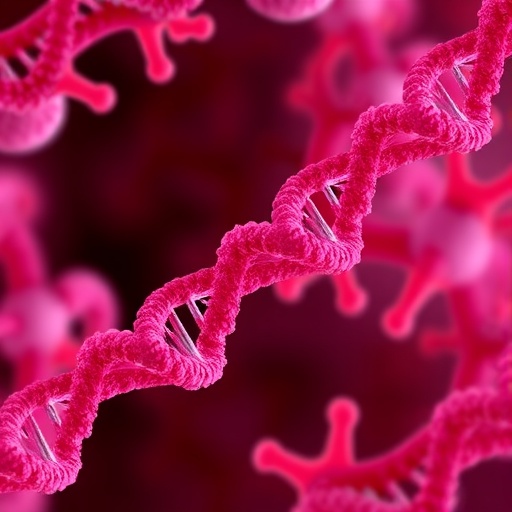Recent advancements in cancer research have illuminated the role of DNA mismatch repair mechanisms and specific tumor markers, leading to a deeper understanding of upper tract urothelial carcinoma (UTUC). A compelling study conducted by Duan et al. offers fresh insights into the relationship between deficient DNA mismatch repair systems and Nectin-4 expression within this type of cancer. Their findings may challenge existing paradigms and open new avenues for targeted therapies.
The significance of DNA mismatch repair in cancer biology cannot be overstated. Mismatch repair is a cellular process that corrects errors occurring during DNA replication, maintaining genomic stability. Deficiencies in this system can lead to an accumulation of mutations and, subsequently, tumorigenesis. In the context of UTUC, understanding how defective repair mechanisms contribute to cancer progression is crucial, as it holds potential implications for patient outcomes and treatment strategies.
Duan and colleagues’ research specifically investigates the link between DNA mismatch repair deficiencies and the overexpression of Nectin-4 in UTUC tissues. Nectin-4 is a cell adhesion molecule implicated in various cellular processes, including immune responses and cell proliferation. Its role as an oncofetal antigen has positioned it as a potential target for immunotherapy, but the interplay between Nectin-4 expression and DNA repair mechanisms has remained largely underexplored.
The study involved a comprehensive analysis of tumor samples from UTUC patients, enabling the researchers to identify correlations between the presence of mismatch repair defects and levels of Nectin-4 expression. The findings suggest that tumors exhibiting DNA mismatch repair deficiencies tend to show significantly elevated levels of Nectin-4 compared to proficient tumors. This raises intriguing questions about the biological processes driving these observations.
The implications of these findings extend well beyond academic interest. The data suggest that assessing Nectin-4 expression could serve as a valuable biomarker for identifying patients with a higher likelihood of having DNA mismatch repair deficiencies. Such stratification could not only enhance prognostic assessments but also inform therapeutic decisions, guiding oncologists toward more personalized treatment approaches.
Moreover, the therapeutic landscape for UTUC is evolving, with a growing interest in targeted therapies and immunotherapies. The identification of Nectin-4 as a relatable marker to DNA repair deficiency underscores the potential for developing innovative treatment strategies. By leveraging this information, clinical trials could pivot towards exploring combinations of immune checkpoint inhibitors with agents that target the underlying DNA repair defects.
As our understanding of the tumor microenvironment deepens, it becomes clear that the interaction between cancer cells and the immune system is complex and multifaceted. Nectin-4’s dual role as both a molecule involved in tumor progression and a potential target for immunotherapy adds another layer of intrigue. The study by Duan et al. encourages further investigation into how Nectin-4 influences immune evasion and whether modulating its expression can enhance the efficacy of immunotherapeutic agents.
In addition to these crucial insights, the study raises the question of whether Nectin-4 expression could be leveraged for early detection of UTUC. Given that early-stage cancers often yield better prognoses, the development of a screening strategy based on Nectin-4 levels could revolutionize how we approach diagnosis and treatment in upper tract urothelial carcinoma.
The findings presented in this research contribute to a growing body of literature that highlights the importance of integrating molecular diagnostics into clinical practice. The ability to classify tumors based on genetic and epigenetic markers is becoming increasingly vital in the era of precision medicine, where tailored treatment regimens can significantly impact outcomes for patients.
As researchers continue to unravel the complexities of UTUC, it is imperative that the scientific community collaborates to further explore these findings. Drawing connections between DNA mismatch repair deficiencies, Nectin-4 expression, and patient outcomes opens numerous research avenues. Initiating large-scale studies focusing on diverse populations may help validate these findings and determine the robustness of Nectin-4 as a clinical biomarker.
Importantly, the applicative potential of this research highlights the value of interdisciplinary collaboration in cancer research. The intersection of molecular biology, immunology, and clinical oncology is where groundbreaking discoveries often occur. It is essential for scientists, clinicians, and pharmaceutical companies to work together to translate these findings from bench to bedside, ensuring that they benefit patients in real-world settings.
In conclusion, the study by Duan and colleagues paves the way for a deeper understanding of upper tract urothelial carcinoma, particularly in relation to DNA mismatch repair mechanisms and Nectin-4 expression. As researchers continue to investigate the implications of these findings, the hope is that it will lead to improved diagnostic tools, more effective therapies, and ultimately, better outcomes for patients battling this challenging form of cancer.
Expanding the knowledge base surrounding UTUC through rigorous research and innovative clinical practices could potentially revolutionize the way this cancer is approached and treated. The journey towards understanding and effectively managing upper tract urothelial carcinoma is ongoing, and the contributions of studies like this one are invaluable in this effort.
The integration of molecular biomarkers like Nectin-4 within clinical protocols could soon become a standard practice, ushering in an era of personalized and precise oncology. It is through the dedication of researchers and clinicians alike that strides in cancer treatment will continue to evolve, enhancing patient quality of life and survival rates in the long term.
Subject of Research: Upper tract urothelial carcinoma, DNA mismatch repair, Nectin-4 expression
Article Title: Deficient DNA mismatch repair and Nectin-4 expression in upper tract urothelial carcinoma (UTUC)
Article References:
Duan, P., Yu, L., Hao, Y. et al. Deficient DNA mismatch repair and Nectin-4 expression in upper tract urothelial carcinoma (UTUC). J Cancer Res Clin Oncol 151, 280 (2025). https://doi.org/10.1007/s00432-025-06312-9
Image Credits: AI Generated
DOI: 10.1007/s00432-025-06312-9
Keywords: DNA mismatch repair, Nectin-4, upper tract urothelial carcinoma, cancer research, immunotherapy, biomarkers, precision medicine, tumor microenvironment.




